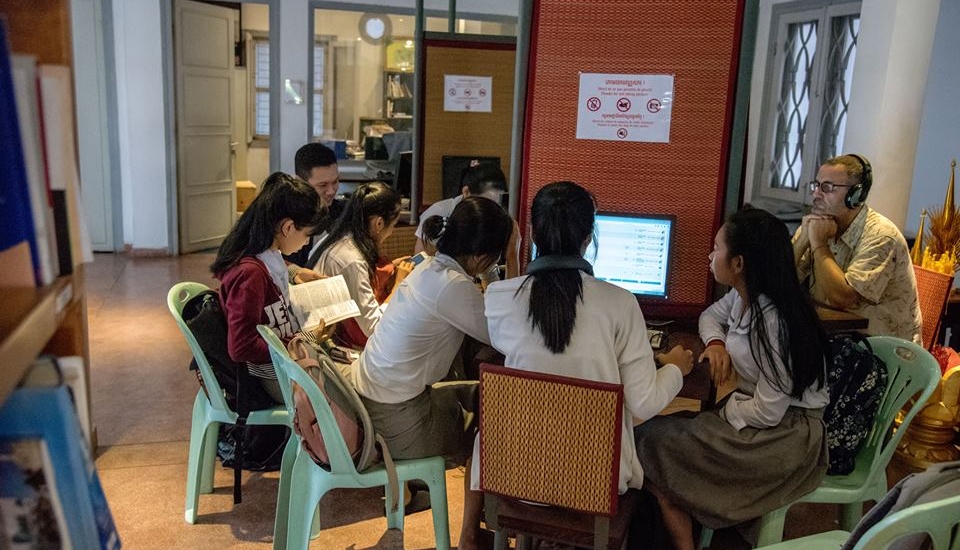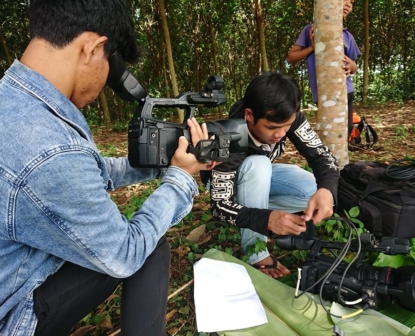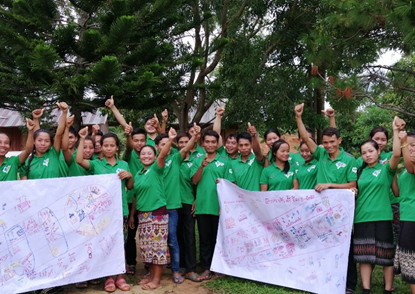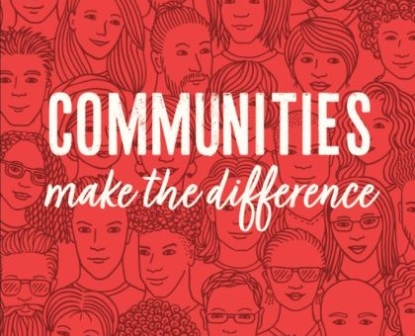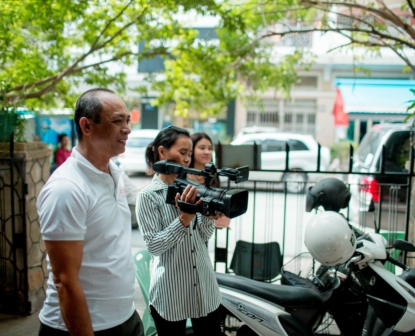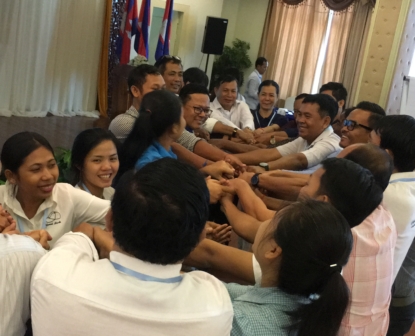Project
Amplifying voices of indigenous women and discriminated groups through innovative multimedia
-
Amount Funded
197,542 EUROProject Duration
01 Oct 2018 - 30 Sep 2020 -
-
Lead organisation
-
Bophana is the name of a young Khmer woman who was a prisoner at S21, a former high school in Phnom Penh turned into a prison by the Khmer Rouge. Bophana continued to write letters to her fiancé, breaking the Khmer Rouge’s interdiction of love and private life. She died in prison at 25, after being tortured for more than five months. By adopting the name of Bophana, the Center is passing on the message of resistance, courage and dignity left for future generations by this woman through her letters and her heroic story. Bophana Center was launched, it was designated as the Bophana Audiovisual Resource Center. Co-founded by film director Rithy Panh, the Bophana Center collects film and sound materials related to Cambodia and gives the public free digital access to this unique heritage. The large quality database attracts a diverse and wide audience, including Cambodian youth, teachers, students, scholars, tourists, and journalists. These archives are also brought to life through conferences, debates, exhibitions, and workshops organised by the Center. Bophana also trains young Cambodians in cinema, audiovisual creation and new media, inspiring meaningful productions about their own culture. A place of exchange and interaction, the Bophana Center also supports creation in all its forms by welcoming artists: they create the archives of tomorrow.
-
Organisation
Bophana is the name of a young Khmer woman who was a prisoner at S21, a former high school in Phnom Penh turned into a prison by the Khmer Rouge. Bophana continued to write letters to her fiancé, breaking the Khmer Rouge’s interdiction of love and private life. She died in prison at 25, after being tortured for more than five months. By adopting the name of Bophana, the Center is passing on the message of resistance, courage and dignity left for future generations by this woman through her letters and her heroic story. Bophana Center was launched, it was designated as the Bophana Audiovisual Resource Center. Co-founded by film director Rithy Panh, the Bophana Center collects film and sound materials related to Cambodia and gives the public free digital access to this unique heritage. The large quality database attracts a diverse and wide audience, including Cambodian youth, teachers, students, scholars, tourists, and journalists. These archives are also brought to life through conferences, debates, exhibitions, and workshops organised by the Center. Bophana also trains young Cambodians in cinema, audiovisual creation and new media, inspiring meaningful productions about their own culture. A place of exchange and interaction, the Bophana Center also supports creation in all its forms by welcoming artists: they create the archives of tomorrow.
-
Project
Cambodia is Southeast Asia’s most homogeneous nation; up to 95% of the approximately 15 million people belong to the Khmer majority. Culturally, Cambodia remains highly patriarchal and hierarchical so that voices of dissent are still not accepted. The situation for women is particularly acute given that knowledge and information on gender and gender equality is still very weak. Cambodia ranked 105 out of 149 countries in the 2013 Gender Inequality Index. There is a high level of discrimination and violence against women in the domestic and public spheres. Gender Based Violence (GBV) against women and girls is a pervasive violence of human rights that persists in every country in the world and cuts across all socioeconomic groups. Many communities are indigenous due to geographical reasons. Different ethnic, social and complex political backgrounds make the situation even more complicated. Even within a well-connected society, indigenous communities still exist where people with disabilities experience violence, and indigenous women and girls are subject to abuse. And indigenous peoples are often exposed to social economic, cultural and political life. Challenges such as land dispossession, conflict, insecurity, displacement, low rates of birth registration, limited access to culturally appropriate education and health services, the lack of access to justice and other essential services, including social services. This project ‘Amplifying voices of indigenous women and discriminated groups through innovative multimedia‘ amplifies voices for indigenous women with/without a disability who have experienced gender-based violence and who are subject to abuse through innovative multimedia. To achieve this goal, Bophana Center integrates different activities such as: • Conducting a needs assessment with women from indigenous communities. • Training youths to make documentary films and produce films. • Organising screenings with relevant stakeholders. • Creating dialogues and awareness raising. • Developing a multimedia platform. • Diffusing films at the various film festivals.
-
-
Cambodia is Southeast Asia’s most homogeneous nation; up to 95% of the approximately 15 million people belong to the Khmer majority. Culturally, Cambodia remains highly patriarchal and hierarchical so that voices of dissent are still not accepted. The situation for women is particularly acute given that knowledge and information on gender and gender equality is still very weak. Cambodia ranked 105 out of 149 countries in the 2013 Gender Inequality Index. There is a high level of discrimination and violence against women in the domestic and public spheres. Gender Based Violence (GBV) against women and girls is a pervasive violence of human rights that persists in every country in the world and cuts across all socioeconomic groups. Many communities are indigenous due to geographical reasons. Different ethnic, social and complex political backgrounds make the situation even more complicated. Even within a well-connected society, indigenous communities still exist where people with disabilities experience violence, and indigenous women and girls are subject to abuse. And indigenous peoples are often exposed to social economic, cultural and political life. Challenges such as land dispossession, conflict, insecurity, displacement, low rates of birth registration, limited access to culturally appropriate education and health services, the lack of access to justice and other essential services, including social services. This project ‘Amplifying voices of indigenous women and discriminated groups through innovative multimedia‘ amplifies voices for indigenous women with/without a disability who have experienced gender-based violence and who are subject to abuse through innovative multimedia. To achieve this goal, Bophana Center integrates different activities such as: • Conducting a needs assessment with women from indigenous communities. • Training youths to make documentary films and produce films. • Organising screenings with relevant stakeholders. • Creating dialogues and awareness raising. • Developing a multimedia platform. • Diffusing films at the various film festivals.
-
“I directed a film, “Don’t Give Up” which featured the resilience of a Kreng teacher. She teaches children in her community in Kreng language – one of the indigenous languages in Ratanakiri Province, North-Eastern of Cambodia. The film has been showing on various occasions, including a national and sub-national dialogue event and I believe it amplified the voices of indigenous women. The film has been used to raise public awareness and make the voices of the indigenous people louder. This has changed my life and that of my community.” Said Phok Rany_ a young trained filmmaker.
This project was very successful in amplifying voices for indigenous women with/without disabilities who have experienced gender-based violence through multimedia. This project trained and built the capacity of 12 young indigenous people to become professional filmmakers. After completing the training, all young filmmakers have returned to their indigenous communities to research and produce documentary films on marginalized women who experienced gender-based violence and who are subject to abuse. The objective of their documentary is to unfold the real stories of marginalized women who experienced domestic violence and other abuse in the community with a strong perception of gender injustice. This project has created an opportunity for marginalized women to raise their voices and concerns to be addressed by relevant stakeholders both at the local and national levels. National and international film screenings, online cinema, Facebook live, online dialogues, and panel discussions are the main activities that were used to amplify the voices of women from the indigenous community although the outbreak of the Covid-19 pandemic still spreading.
The community dialogue/ screening on films documentary which is an approach of this project has contributed to the change of social acceptance of indigenous women who experience GBV. This was observed during the film screening and discussion in Ratanakiri province, indigenous youths from different communities are aware of issues/GBV experienced by indigenous women. Also, they discovered the negative impact of early age marriage that will be affecting not only the family economy but also the health of both parents and children. Moreover, they have learned that violence against women/GBV is not social acceptance of indigenous women but it is an issue that members of the communities have to solve and find a better solution.
To increase access to culturally appropriate education, health, and justice for indigenous women with/without disability who have experienced gender-based violence, this project has conducted the online dialogue at the national level with the key persons from the indigenous communities (such as chiefs of village, chief of the commune), civil societies and a representative from Ministry of women affairs to discuss on promoting education, health, social service support and legal support for women and girls in indigenous communities. These online dialogues were very successful with very proactive discussion, sharing, and comments among all participants and guest speakers from relevant stakeholders.
This project has engaged indigenous women who experience GBVs to break silent of violence and have their voices heard. To achieve this, the team has advocated and dealt with local authorities, indigenous communities since the beginning of the project. They have tried very hard and spent a lot of time building trust for indigenous communities on their project. They work closely and collaborate with local authorities so that the young trained could investigate the issues faced by indigenous women. They trained the young filmmakers to make good communication and to build confidence with the protagonists to have confidence and allow them to document their stories. When the contents of the documentary films are produced by indigenous youth from the indigenous community, the members of the communities feel proud of the outcomes made by their youth.
The young trained filmmakers have a strong commitment to making more films to amplify the voice of their community. They bring the knowledge gained from the project and their work experience to share with their community members. In this project period, the young trained indigenous have a strong willingness in communicating with youths and local authorities from their communities to attend the film screening and experience sharing event and to participate in online dialogue. The young trained indigenous has provided technical support to youths and local authorities to make sure their events happen.
Future plans of the project and/or its rightsholder:
- So far, Bophana has built many connections with TV, local production, and NGOs to share with them the trained young filmmakers who are capable to help them in making a short video for the benefit of their institution. They have been contacted by some SME companies to send them young trained filmmakers to work for them. An NGO like CARE Cambodia had hired some of the youth filmmakers in Ratanakiri province to use their videography services.
- The young filmmaker continues to produce more films on GBV and other issues about their community.
- The young trained filmmakers are so ambitious in making more films because they are willing to make feature documentary films in the near future.
Publications:
Videos:
- Two Team, One visions: https://voice.global/blog/two-teams-one-vision/
- Daring to Dream: https://voice.global/blog/daring-to-dream/
- Let’s make a movie! https://voice.global/blog/lets-make-a-movie/
- Our voices through film! https://voice.global/blog/our-voices-through-film/
Case studies and blog:
Magic photo of Rany: https://voice.global/5years/magic-moment-rany/
All project activities and video production under this project: https://www.facebook.com/amplifyingvoice/
Certificate ceremony for the trained young filmmaker: KhmerTimes news
-
News

